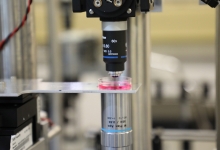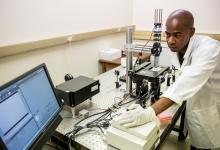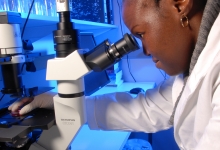Bio-photonics
The CSIR’s Bio-photonics research team follows a laser-driven lab-on-a-chip approach, which has the potential of converting any test to a point-of-care diagnostic format. Since infectious diseases such as HIV are still reported as major causes of mortality, particularly in the developing world, innovation around point-of-care diagnostics has the potential to reduce the burden of disease. Improvement of the current HIV diagnostics to incorporate immediate CD4 count and viral load testing, would have a massive impact in informing treatment decisions and management. Knowing exactly when to start antiretroviral treatment and monitoring its effectiveness may help alleviate some of the current challenges endured by HIV patients, such as the development of viral resistance.
The point-of-care diagnostics approach undertaken by this team seeks to develop a laser-driven cost-effective HIV-1 diagnostic device that is easy to use at point-of-care settings and in low-resourced settings.
The design of a photonics-based cell-sorting micro-chip, coupled with super- resolution imaging and spectroscopic techniques, could pave the way for the invention of highly specific HIV-1 diagnostic tools: A kit that not only confirms the presence of HIV-1, but is able to also indicate genotypic information and the viral load. The bio-photonics team has set out to develop an optical tweezer and/or deflection system that will be able to sort HIV-1 infected cells from a mixed population of cells. In particular, the team plans to apply and use, for the first time, laser light of novel beam shapes to study single molecule analysis in HIV-1 infected cells.









